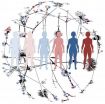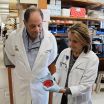(Press-News.org) Fortunately, more and more people survive critical illnesses and accidents. A new Danish-American survey shows, however, that hospitalisation where the patient has received mechanical ventilation can have serious consequences:
- Of course, the good news is that more and more patients survive critical illness and treatment using ventilators. But at the same time, the bad news is that we have now documented that the ventilator patients have a considerable risk of developing psychological problems.
The first few months after discharge are really critical, says professor of clinical epidemiology Henrik Toft Sørensen, Aarhus University and Aarhus University Hospital.
He is behind the hitherto largest study of psychiatric problems before and after treatment that involves mechanical ventilation treatment. The sensational results have just been published in the prestigious Journal of the American Medical Association (JAMA).
In the study, 24,179 mechanically ventilated patients admitted to all Danish intensive care units in the period 2006-2008 were compared with other admitted patients, as well as with the general population.
Surprisingly many
"The study shows that up to 13 percent of the ventilator patients - that's to say one in seven - were prescribed medication for psychological problems within the first three months after the hospital admission. We were well aware that there was an increased risk, but we had not expected the figure to be so high," says Henrik Toft Sørensen, and adds:
"By comparison, five percent of the patients who had not been mechanically ventilated received medication for psychological problems after the hospital admission."
The medication typically covers sleeping medicine, anxiety medication or antidepressant medicine.
Half a percent of the mechanically ventilated patients had such severe psychological problems that they received a psychiatric diagnosis from a psychiatric hospital within the first 3 months after the hospital discharge.
Serious consequences
Henrik Toft Sørensen believes that there is a considerable need for an increased focus on prevention and treatment of psychological problems in patients who survive critical illness:
"Psychological problems have profound human and socio-economic costs. Among patients, relatives and medical doctors, there ought to be a much greater degree of knowledge and awareness of the long-term consequences of critical illness. It is important that we all become better at taking early steps towards the right prevention and treatment," he says.
INFORMATION:
The study was conducted together with recognised American researchers from Columbia University in New York as well as from the University of Pittsburgh in Pennsylvania.
Read more
Read the survey here: http://jama.jamanetwork.com/article.aspx?articleid=1841968
Further information
Professor, Consultant, MD, PhD Henrik Toft Sørensen
Aarhus University, Department of Clinical Medicine, Department of Clinical Epidemiology
E-mail: hts@dce.au.dk
Tel: +45 8716 8215 / +45 5168 0555
Staff specialist, Clinical Associate Professor, PhD, Christian Fynbo Christiansen
Aarhus University, Department of Clinical Medicine, Department of Clinical Epidemiology
E-mail: cc@dce.au.dk
Tel: +45 8716 8218 / +45 2020 8398
Critical illness increases risk of psychological problems
New research shows that every seventh person who has received mechanical ventilation risks developing anxiety, depression and insomnia; Improved prevention is needed, according to the professor behind the study
2014-03-19
ELSE PRESS RELEASES FROM THIS DATE:
Multidisciplinary research team led by Tufts CTSI proposes new model for clinical trials
2014-03-19
BOSTON (March 19, 2014) – Experts across academia, industry and government propose a new method for health care providers to get the right treatments to the right patients at the right time. This new approach, A Proposal for Integrated Efficacy-to-Effectiveness (E2E) Clinical Trials, published in Nature Clinical Pharmacology & Therapeutics, recommends a seamless transition from controlled experiments to real-world comparative effectiveness trials. This continuum will improve the accuracy of treatment selection and better determine how those treatments work on different ...
Lied-to children more likely to cheat and lie
2014-03-19
People lie – we know this. People lie to kids – we know this, too. But what happens next? Do children who've been lied to lie more themselves?
Surprisingly, the question had not been asked experimentally until Chelsea Hays, then an undergraduate student in psychology at the University of California, San Diego, approached professor Leslie Carver with it. Now the pair have a paper out in Developmental Science, suggesting that adult dishonesty does make a difference, and not in a good way.
"As far as we know," said Carver, associate professor of psychology and human development ...
Small step towards growing tissue in the lab
2014-03-19
University of Adelaide mathematicians have devised a method for identifying how cell clusters have formed by analysing an image of the cluster.
Published in the Journal of Theoretical Biology, their mathematical modelling tool will be useful in helping biologists and tissue engineers to move towards growing human tissue such as liver in the laboratory.
"When any tissue or organ develops, the cells have to organise themselves into the correct structure," says Dr Edward Green, researcher in the University's School of Mathematical Sciences. "This self-organisation process ...
Ancient DNA shows moa were fine until humans arrived
2014-03-19
A study by Curtin University researchers and colleagues from Denmark and New Zealand strengthens the case for human involvement in the disappearance of New Zealand's iconic megaherbivore, the moa - a distant relative of the Australian Emu.
All nine species of New Zealand moa, the largest weighing up to 250 kilograms, became extinct shortly after Polynesians arrived in the country in the late 13th century.
Researchers have previously suggested, from limited genetic evidence, that huge populations of moa had collapsed before people arrived and hence influences other ...
No-refrigeration, spray vaccine could curb diseases in remote areas
2014-03-19
DALLAS, March 19, 2014 — A new kind of single-dose vaccine that comes in a nasal spray and doesn't require refrigeration could dramatically alter the public health landscape — get more people vaccinated around the world and address the looming threats of emerging and re-emerging diseases. Researchers presented the latest design and testing of these "nanovaccines" at the 247th National Meeting & Exposition of the American Chemical Society (ACS), the world's largest scientific society.
Their talk was one of more than 10,000 presentations at the meeting, being held here ...
Understanding binge eating and obesity
2014-03-19
VIDEO:
In this JoVE video article, a set of methods to measure food-related motivation and values are described in JoVE's peer-reviewed video article format.
Click here for more information.
March 19, 2014 —Researchers at the University of Cambridge have developed a novel method for evaluating the treatment of obesity-related food behavior. In an effort to further scientific understanding of the underlying problem, they have published the first peer-reviewed video of their technique ...
101 liver cancer drug candidates pave the way to personalized medicine
2014-03-19
The heart disease drug perhexiline is one of 101 compounds predicted to prevent cancer growth in most patients suffering from our most common liver cancer, HCC. This is an outcome from a novel simulation-based approach using personal sets of proteins of six HCC patients.
"This is the first time personalized models have been used to find and evaluate new potential drugs," says Professor Jens Nielsen at Chalmers University of Technology.
--
Our most common liver cancer, Hepatocellular carcinoma, HCC, causes more than half a million deaths worldwide every year. If the ...
Gut bacteria can cause life-threatening infections in preterm babies
2014-03-19
Babies born prematurely are surviving in increasing numbers. But many withstand complications of early birth only to suffer late-onset sepsis — life-threatening bloodstream infections that strike after infants reach 72 hours of age.
While early-onset sepsis often is caused by pathogens acquired from the amniotic sac or birth canal, the causes of late-onset sepsis have been far less clear.
But now, researchers at Washington University School of Medicine in St. Louis have discovered that preterm babies' guts harbor infectious microbes that can cause late-onset sepsis.
The ...
Drinking alcohol several times a week increases the risk of stroke mortality
2014-03-19
Consuming alcohol more frequently than twice a week increases the risk of stroke mortality in men, according to a study carried out at the University of Eastern Finland. The results show that the effects of alcohol are not limited to the amount consumed, but also the frequency of drinking matters. The results were published in Acta Neurologica Scandinavica on 8 March.
Excessive consumption of alcohol is associated with a variety of different diseases. The relationship between alcohol consumption and ischaemic stroke shows a J curve pattern, which means that in people ...
GPS also helps to analyze global water resources
2014-03-19
This news release is available in German. FRANKFURT. WaterGAP (Water Global Assessment and Prognosis) is a hydrological model used to model water shortage, groundwater depletion, and floods and droughts (e.g. as impacted by climate change) over the land area of the globe. The Frankfurt hydrologist Prof. Petra Döll has examined how good a fit this model provides, using GPS observations and data from the GRACE satellite, which measures the gravitational field of the Earth. The study, published in the current issue of the scientific journal Surveys in Geophysics indicates ...
LAST 30 PRESS RELEASES:
Black soldier fly larvae show promise for safe organic waste removal
People with COPD commonly misuse medications
How periodontitis-linked bacteria accelerate osteoporosis-like bone loss through the gut
Understanding how cells take up and use isolated ‘powerhouses’ to restore energy function
Ten-point plan to deliver climate education unveiled by experts
Team led by UC San Diego researchers selected for prestigious global cancer prize
Study: Reported crop yield gains from breeding may be overstated
Stem cells from human baby teeth show promise for treating cerebral palsy
Chimps’ love for crystals could help us understand our own ancestors’ fascination with these stones
Vaginal estrogen therapy not linked to cancer recurrence in survivors of endometrial cancer
How estrogen helps protect women from high blood pressure
Breaking the efficiency barrier: Researchers propose multi-stage solar system to harness the full spectrum
A new name, a new beginning: Building a green energy future together
From algorithms to atoms: How artificial intelligence is accelerating the discovery of next-generation energy materials
Loneliness linked to fear of embarrassment: teen research
New MOH–NUS Fellowship launched to strengthen everyday ethics in Singapore’s healthcare sector
Sungkyunkwan University researchers develop next-generation transparent electrode without rare metal indium
What's going on inside quantum computers?: New method simplifies process tomography
This ancient plant-eater had a twisted jaw and sideways-facing teeth
Jackdaw chicks listen to adults to learn about predators
Toxic algal bloom has taken a heavy toll on mental health
Beyond silicon: SKKU team presents Indium Selenide roadmap for ultra-low-power AI and quantum computing
Sugar comforts newborn babies during painful procedures
Pollen exposure linked to poorer exam results taken at the end of secondary school
7 hours 18 mins may be optimal sleep length for avoiding type 2 diabetes precursor
Around 6 deaths a year linked to clubbing in the UK
Children’s development set back years by Covid lockdowns, study reveals
Four decades of data give unique insight into the Sun’s inner life
Urban trees can absorb more CO₂ than cars emit during summer
Fund for Science and Technology awards $15 million to Scripps Oceanography
[Press-News.org] Critical illness increases risk of psychological problemsNew research shows that every seventh person who has received mechanical ventilation risks developing anxiety, depression and insomnia; Improved prevention is needed, according to the professor behind the study



